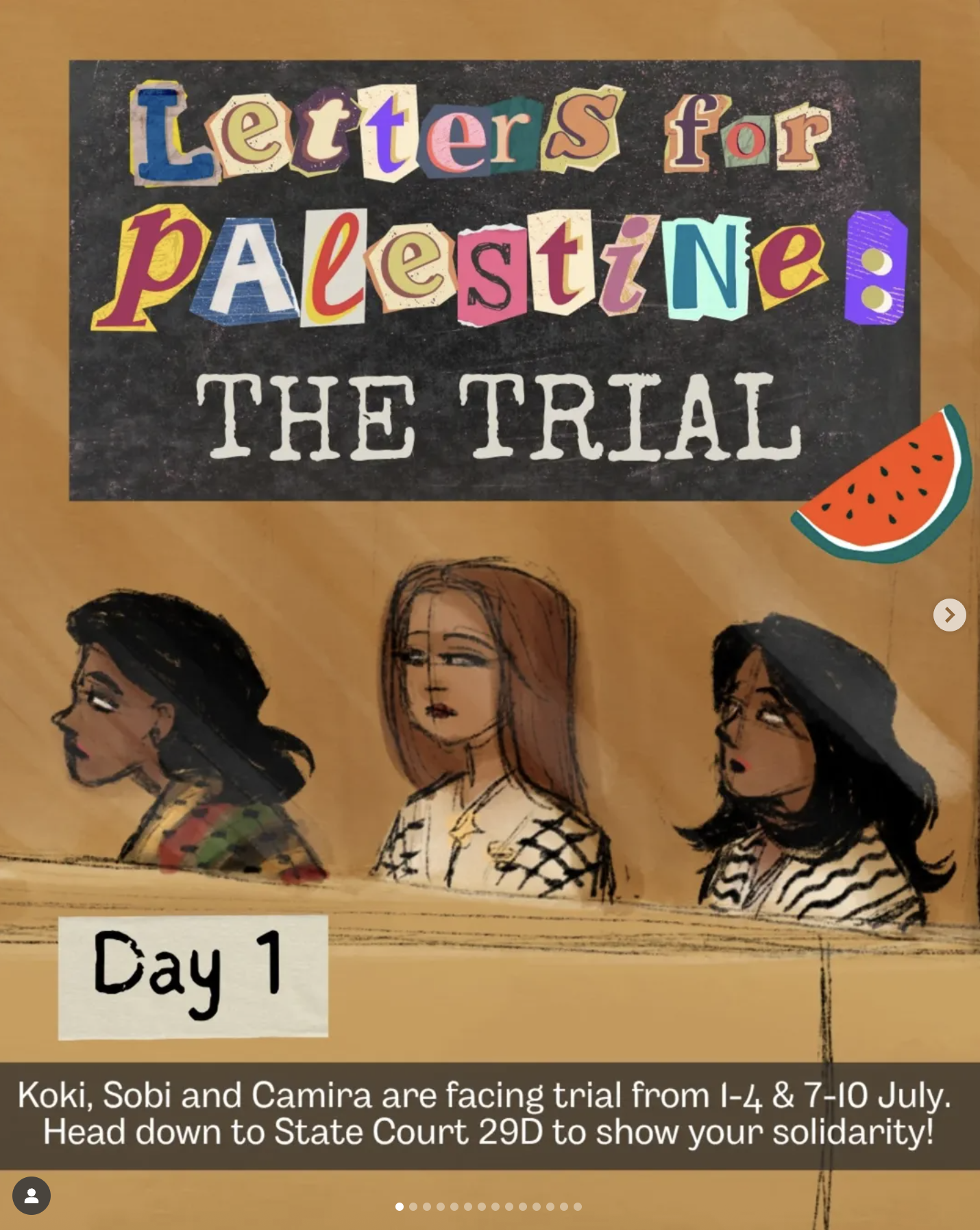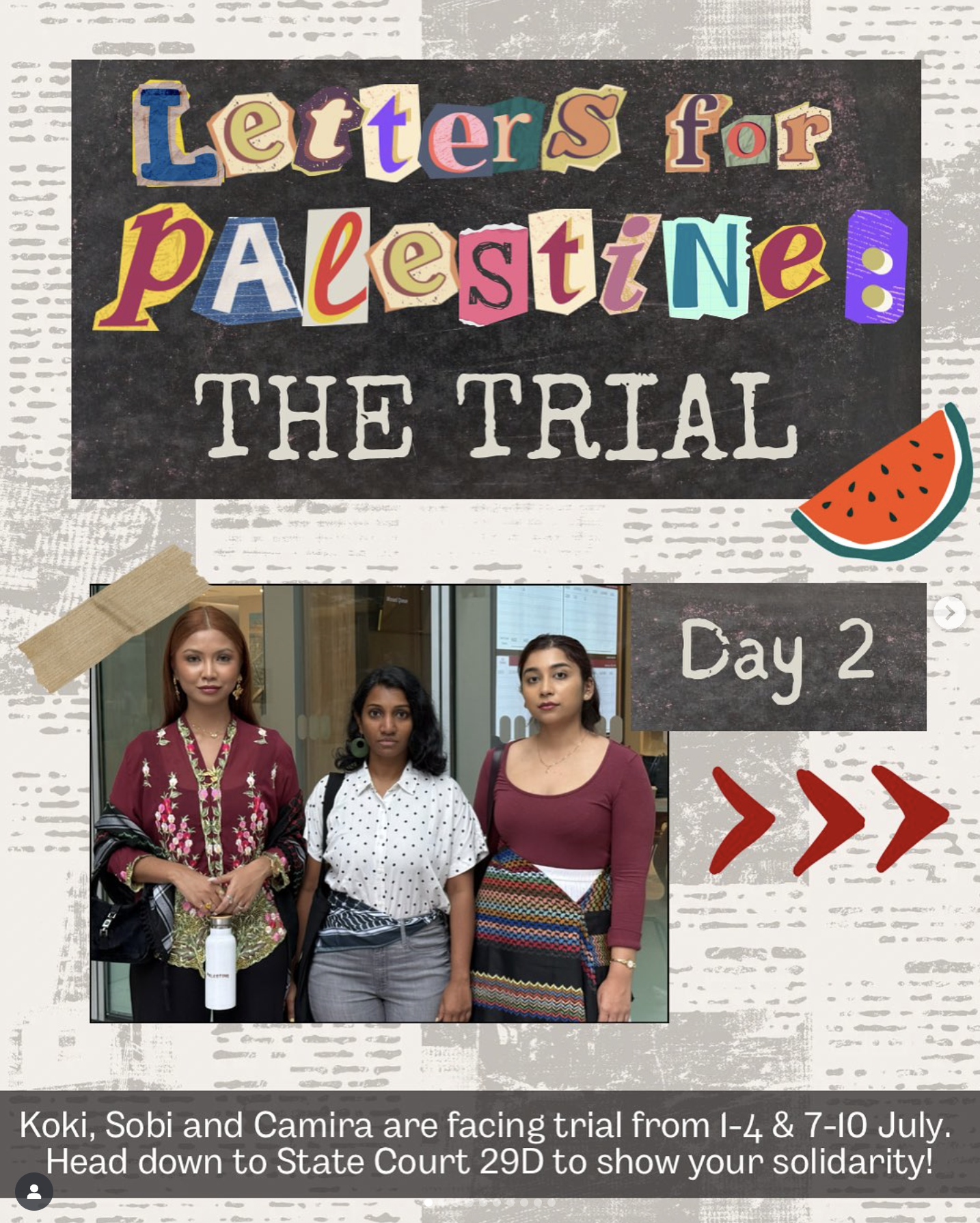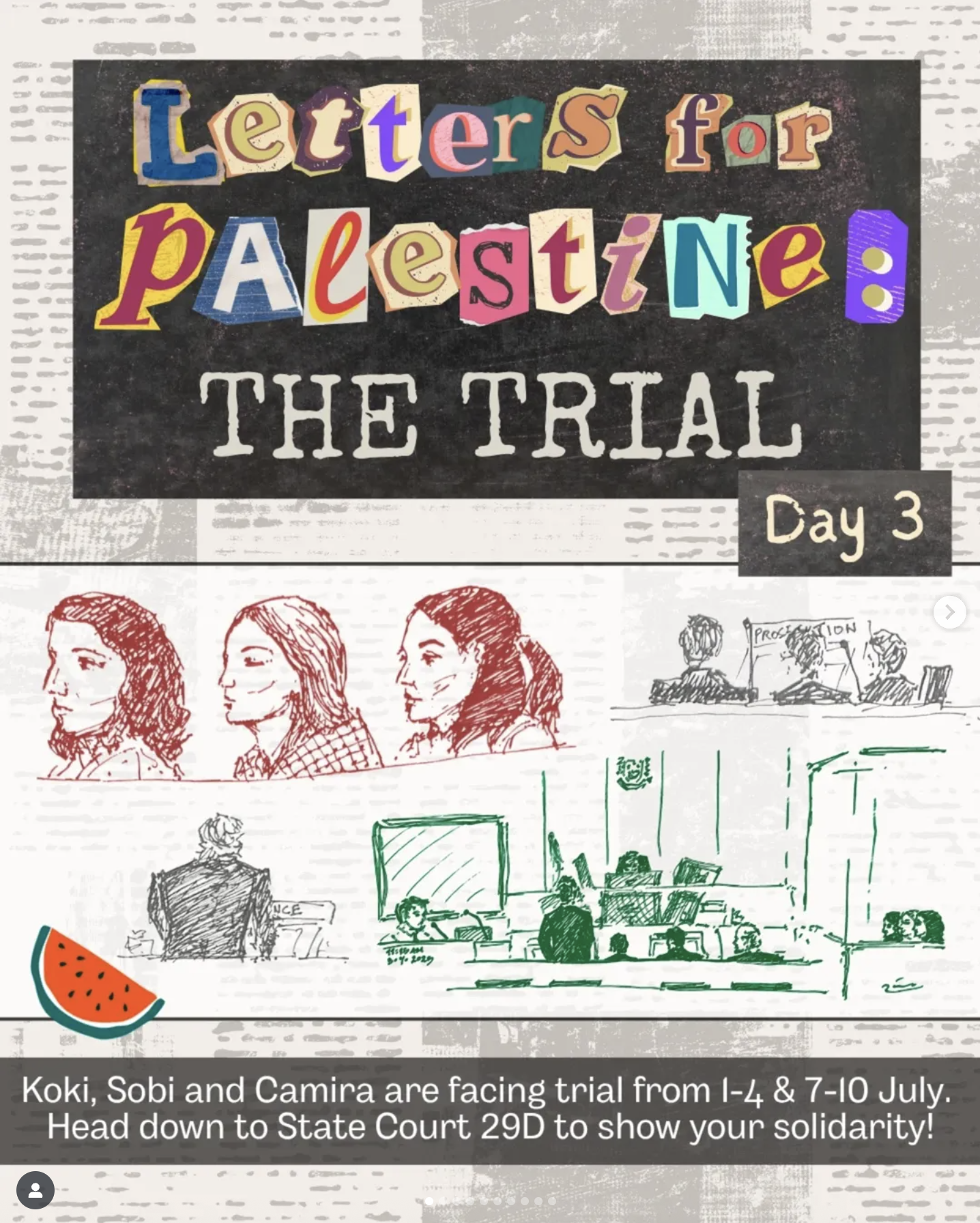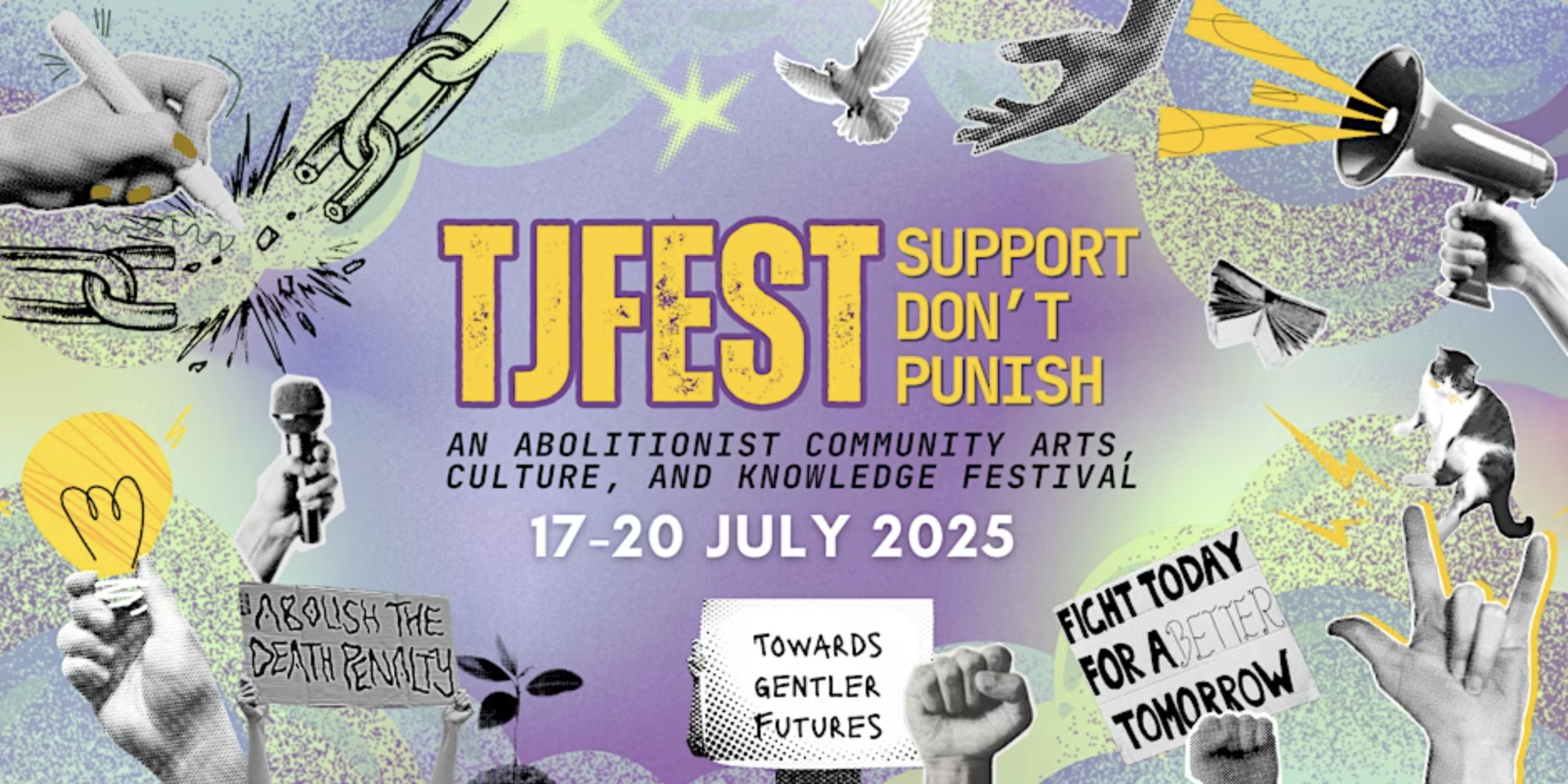I'm back from a quick—and rather packed—trip to Bangkok, and now it's going to be a full-on weekend of work work work to get all the articles ready for Mekong Review's August 2025 issue to go to layout. #help
(1)
Wanna see how your taxpayer money gets wasted? Here's Exhibit A: this week saw the opening of the trial of Kokila Annamalai, Camira Asrori and Sobikun Nahar, who were charged under the Public Order Act last year for their involvement in the collective delivery of letters to the Istana in solidarity with Palestine. Over on Instagram, Students for Palestine Singapore (@sgacadboycott) have been covering the trial, providing daily court sketches and updates.



Much gratitude to the volunteers of @sgacadboycott for this public service! Follow them on Instagram for updates.
Some key points so far:
- The authorities determined that the letter delivery was a procession because it was visible to the public, involved a group of people and was for "a common cause". The police determined the "common cause" part by the presence of watermelon umbrellas, "common colours" of black, white, green and red (say Palestine flag lah) and a "black and white" fabric design (say keffiyeh lah, aiyoh).
- The walk was orderly; no one shouted and there were no placards.
- The commanding officer of the Istana Security Unit confirmed that people had been cooperative and "posed no security threat", which is why he didn't try to disperse them and even helped to stop traffic to allow some of the participants to cross the road to deliver the letters.
So it was basically a very simple collective act that caused no disorder, no harm and no threat to anything or anyone, and the state response was: hours of police time spent questioning multiple people, hours of AGC time spent reading through and evaluating the statements, and hours of court time from mentions to the trial hearings. All of this involving police officers, prosecutors, lawyers and judges who all, I presume, have much more pressing and important matters that they could have been attending to instead. The amount of public resources spent on this is just ludicrous.
The trial is set to continue until Thursday, 10 July. There's also an ongoing crowdfunding campaign to covering legal fees for Koki, Camira and Sobi.
(2)
Pritam Singh went on a Malaysian podcast and the PAP is really freakin' pressed about it. On 30 June, a blog post on ruling party organ Petir took aim at Singh's appearance on Keluar Sekejap, a popular Malaysian podcast hosted by Shahril Hamdan, formerly an economic director in the Prime Minister's Office under Malaysian Prime Minister Ismail Sabri Yaakob, and Khairy Jamaluddin, Malaysia's former health minister.
If you're curious about what the hoo-ha is all about, here's the podcast episode.
"Why would the Leader of the Opposition choose a foreign platform to air his views on Singapore’s domestic politics?" fumed Petir. When that blog post didn't gain very much traction—because Petir is a consistent source of truly insufferable writing—the PAP refused to drop it and issued a press statement on 3 July:
Does Mr Singh truly stand by the principles he has stated? Or are they only invoked when convenient? Does he believe foreign involvement is acceptable when it benefits his party?
Singapore and Malaysia share close historical ties, but we also respect each other’s sovereignty. In the wake of the painful racial unrest of the 1960s, both sides have observed a careful boundary: we refrain from commenting on each other’s politics, and from using each other’s media to influence public opinion.
This is a longstanding understanding that has served both nations well. Maintaining it requires political leaders of integrity who place national interest above partisan gain.
As a sovereign nation, we must be clear: Politics should stop at the water’s edge. Singapore’s affairs are for Singaporeans to decide, based on what is best for our national interests.
Interestingly, neither the Petir blog post nor the PAP's statement point to specific instances of the podcast where they feel like Singh has said something that undermined Singapore's sovereignty or invited foreign meddling. It seems like the very act of being interviewed on a foreign podcast is the problem. But politicians of all stripes sit down for interviews with foreign media all the time, without it automatically being assumed that they're inviting foreign interference.
I'm still catching up, so I haven't heard the whole podcast yet. (And, if I'm being super honest, I hadn't planned on listening to it until the PAP kicked up such a big stink.) But what I've heard so far is a fairly solid, meaty interview. The hosts are asking reasonable and incisive questions, including pushing Singh to elucidate the ideological difference between WP and the PAP (which I don't think he answered super well given that Singaporean politics are, well, liddat 🫠). Some of these questions I'm hearing, I'm not sure that a Singaporean interviewer would have asked or pushed for an answer in the same way. It's actually pretty interesting because Singaporean politics is so bizarre in a variety of ways—GRCs? An opposition party that doesn't want to form government and tells you so as part of their campaign strategy?—that it's refreshing to see an in-depth conversation where the non-Singaporean hosts are like, what the hell's that about? It's a nudge for both Singh, as the interviewee, and us, as the listeners, to reflect on how our specific context differs from the way politics works elsewhere, for better or worse.
The Workers' Party has since responded, essentially telling the PAP to sit their ass down and stop "opposing for the sake of opposing":
The Leader of the Opposition is not a member of the executive. There is no legal convention that has been communicated to him which fetters his freedom of speech, locally or overseas. Should there be such a guideline, it should be made known.
PAP leaders routinely give interviews and share their views on domestic matters to foreign media outlets. These interviews are not out of the ordinary. In fact, some of these interviews have gone viral and are well-received by an international audience, embellishing the PAP. In these circumstances, no right-thinking individual would accuse the PAP of “foreign involvement” to benefit the party.
In fact, we are aware that one PAP member, after viewing the Keluar Sekejap podcast, remarked, “Pritam did well”. Other PAP members happily posed for pictures with one of the hosts of the Keluar Sekejap podcast when the latter was in Singapore over the weekend. These actions would lead any Singaporean to an irresistible conclusion: that the Leader of the Opposition’s appearance on the podcast had no detrimental impact whatsoever on Singapore’s national interests.
(3)
The Protection from Scams Act has come into force. This means that the police can now issue Restriction Orders to banks to put limits on people's accounts to stop them from transferring or withdrawing money from their account or accessing credit services. This, the Ministry of Home Affairs says, will be a last resort that the police will use after they've failed to persuade people not to transfer money to scammers through other means. Such ROs, issued by police officers without having to go through the courts, can be issued for up to 30 days at a time and renewed multiple times to last for a total of up to six months. Banks that breach restriction orders without good reason can be fined up to $3,000.

Thank you for reading! As always, feel free to forward this weekly wrap to anyone you like, and spread the word about this newsletter!

